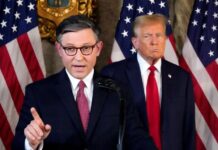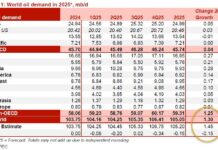Speaking at the Munich Security Conference in Washington on Wednesday, US Vice President JD Vance said that America’s security posture of the past 20 years is no longer adequate for the challenges of the next two decades. He stressed the need for the US to rethink and modernise its national defence strategy to address emerging global threats, including the world’s disintegration into a bipolar state and the weaponisation of supply chains by foreign adversaries.
During a question-and-answer session at the Munich Security Conference, Wolfgang Ischinger—former German ambassador to the United States and longtime chairman of the conference—asked Vice President Vance whether the Trump administration sees the United States as a continuing “European superpower.”
The vice president’s response reaffirmed that the US and Europe remain fundamentally united, describing them as part of the same “civilizational team.” While acknowledging that he has often been labeled a “hyperrealist” focused on transactional foreign policy, he stressed that his view of US-European relations goes beyond mere interests, highlighting shared cultural and historical ties.
He noted that disagreements are inevitable, but stressed the need for transatlantic cooperation, especially in rethinking defense strategies for the next 20 years, even into the 2030s. Vance also called for greater European burden-sharing, arguing that the current security posture is outdated and must evolve.
Here is Vance’s full, unedited response:
And yes, I still firmly believe that the United States and Europe are on the same team. And I think I’ve been criticized sometimes as a hyperrealist, right? I think about foreign policy purely in terms of transactional values.
What does America gain from this? What does the rest of the world gain from this? And we try to focus so purely on the transactional value of it that we sometimes ignore the humanitarian or moral side. And I think, at least in the case of Europe, that’s not a complete summary of my views, because I think that European civilization and American civilization, European culture and American culture are very much connected and will always be connected, and I think it’s absolutely ridiculous to think that it’s ever possible to drive a solid wedge between the United States and Europe.
That doesn’t mean we don’t have disagreements, and of course you know you brought this up earlier. That doesn’t mean Europeans don’t criticize the United States or the United States doesn’t criticize Europe.
But I think fundamentally we need to be and we are on the same civilizational team. And I think obviously the big question is what that means in the 21st century. I think you know, President, and I believe that it means a little bit more burden-sharing between Europe and Europe in the area of defense. I think it means that we have all become a little bit too comfortable, frankly, on both sides of the Atlantic, with the security posture of the last 20 years, and that frankly, that security posture is not sufficient to meet the challenges of the next 20 years.
So there are many ways in which this alliance will evolve and change in the same way it evolved and changed from 1945 to 1975 and from 1975 to 2005. I think we are in one of those stages where we need to rethink a lot of big questions, but I think we should rethink these big questions together.
Vance signals a turning point in defense policy, suggesting that the post-9/11 focus on counterterrorism and regional conflicts (such as Iraq and Afghanistan) has now shifted toward national threats, particularly from China, Russia, Iran, and non-traditional areas, such as:
- Cyberwarfare
- Artificial intelligence
- The militarization of space
- Supply chain vulnerabilities
- Nuclear and hypersonic weapons
President Trump’s worldview favors greater coordination of national and hemispheric defense across the Americas, hence the push for stronger economic integration between the U.S. and Canada, accompanied by a reinforced defense perimeter stretching from the Arctic to the Panama Canal.
Steve Bannon previously said that everything revolves around “hemisphere control,” noting that a new era of hemispheric defense will begin across America when Trump brings peace to Eastern Europe.
Strengthening hemispheric defenses could include President Trump’s proposed “Golden Dome” defense system. A recent Congressional Budget Office report says that developing this missile defense network could cost $542 billion over 20 years.
Arthur Herman recently wrote in the National Interest magazine how “combining U.S. and Canadian resources, from energy to artificial intelligence to defense, would be a boon to both global and world security.” In other words, a U.S. and Canadian “superpower” could emerge in the 2030s, capable of handling any threat the world throws at it.






















